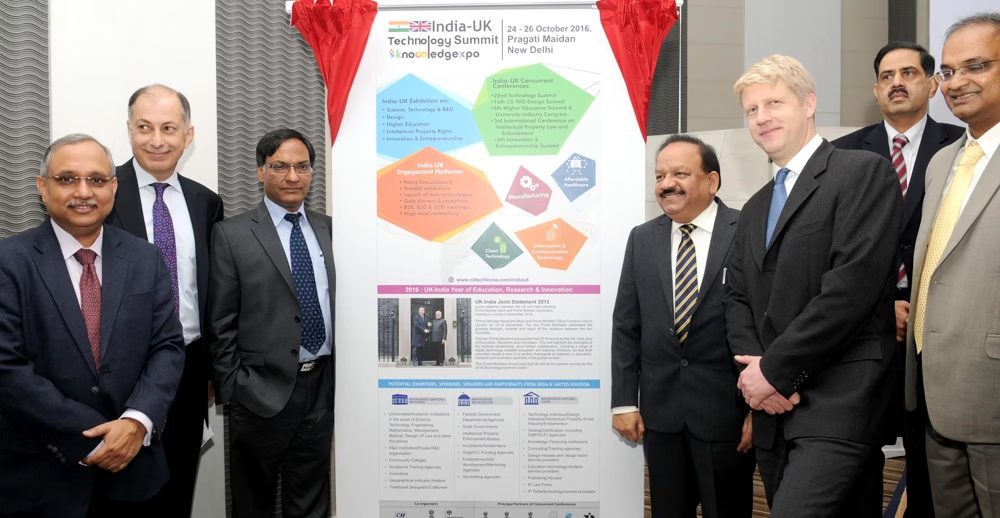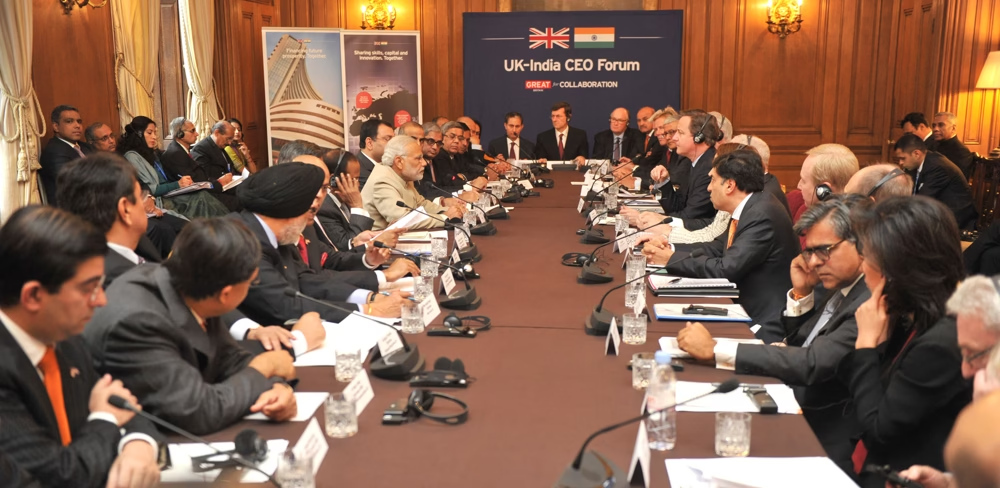The historic UK India FTA 2025, announced in May, promises to supercharge bilateral trade and open new markets for Indian firms. The pact is projected to raise UK–India trade by about £25.5 billion (US$34 billion) annually by 2040, up from roughly £42.6 billion today. Services and digital goods will drive much of this expansion. For Indian IT companies and tech startups, the FTA creates a more business-friendly environment in the UK, while automakers will benefit from steep tariff cuts on vehicles and components. This is a significant opportunity for Indian exporters and offshoring firms to expand their global reach. This is great news for Indian exporters and offshoring firms, and SeaInfotech is well–positioned to help navigate these opportunities.
IT Outsourcing Under the UK India FTA 2025
Collaboration at a UK–India CEO Forum meeting, illustrating growing business and technology ties between the two nations. The FTA includes special provisions that make Indian IT firms more competitive in the UK market. Notably, Indian IT professionals and their employers will be exempt from UK National Insurance (social security) contributions for three years under a Double Contribution Convention. The Indian government hailed this exemption as a “huge win” that will “make Indian service providers significantly more competitive in the UK”. With giants like TCS, Infosys and Wipro already established in Britain and hundreds of smaller firms expanding, this cost advantage can translate into more outsourcing contracts and UK-based projects for Indian teams.
The FTA also locks in business travel and mobility between India and the UK. Existing routes for consultants, engineers and IT specialists to travel for short–term projects will continue indefinitely, giving companies confidence to send teams back and forth. On the digital side, the agreement’s chapter on digital trade reduces paperwork and encourages e–commerce and innovation. For example, the FTA supports the use of electronic contracts and authentication, and protects software source code from forced transfer. This means UK clients can more easily engage Indian developers and cloud providers, and Indian tech firms can sell digital services into the UK without burdensome new regulations.
Encouraging UK–India Tech Partnerships and Innovation

Launch of the India–UK Technology Summit (2016) in New Delhi, symbolizing bilateral collaboration in research and innovation. Beyond outsourcing, the FTA formally encourages tech partnerships and R&D collaboration. A dedicated “Innovation” chapter establishes an Innovation Working Group, which will bring government, industry and academia together to coordinate joint research, share best practices, and ease barriers to new technologiesgov.uk. Both countries have agreed to bolster trade in innovative products and services, recognizing that “innovation and research and development investment…significantly boost productivity growth”.
In practical terms, this means Indian and UK firms – from startups to multinationals – can more easily team up on cutting–edge projects. The FTA’s digital trade rules explicitly seek to “drive innovation and support emerging technologies through UK–India collaboration”. Joint work on AI, fintech, biotech or clean energy is therefore encouraged. Indian business leaders have hailed the agreement as a gateway to “shared innovation” and deeper collaboration. For example, the FTA could support UK partners in India’s Digital India initiatives or help Indian software companies co-develop products with British universities and tech hubs.
SeaInfotech can act as a bridge for these collaborations. We have experience matching Indian software teams with UK R&D projects: whether it’s integrating sensors into new IoT devices, developing fintech applications for open banking, or building data analytics tools for healthcare. Our teams are familiar with both Indian engineering talent and UK industry standards. We can help arrange co-development workshops, manage intellectual property concerns (following the FTA’s strengthened IP rules), and navigate any joint grant or procurement opportunities that open up.
Automotive Sector Expansion Through the FTA
The UK–India FTA dramatically lowers trade barriers in the automotive sector. India will cut import duties on British cars and vehicles from over 100% to just 10% within quotas. In turn, nearly 99% of India’s exports to the UK will face zero duties, including motorcycles, auto parts and components. This tariff elimination unlocks big opportunities: UK luxury cars (like Jaguar Land Rover models) and parts become cheaper for Indian buyers, while Indian-made auto goods find it far easier to enter the UK market.
Indian automakers are already moving to capitalize on this. Mahindra & Mahindra plans to export its new electric SUVs (BE 6 and XUV 9e) to right–hand–drive markets such as the UK, explicitly citing the FTA’s tariff cuts. TVS Motor is ramping up production of the British Norton motorcycle brand at its plant in Hosur, Tamil Nadu – a strategic shift enabled by the trade deal. Even Tata Motors’ UK unit (JLR) is investing in India: a new Ranipet (Chennai) facility will co-develop models for both domestic and international markets.
As the industry electrifies, India’s skilled workforce and cost-efficient manufacturing are seen as a global hub for innovation in electric mobility. The FTA’s full market access across all sectors means Indian auto suppliers can integrate into UK value chains, and UK firms can participate in India’s EV and automotive supply chains. This creates demand for software and tech solutions – for example, automotive engineering software, connected car IoT systems, battery R&D tools, and AI-driven manufacturing.
SeaInfotech can support automotive companies on both sides with these high-tech needs. We offer expertise in embedded software development, telematics platforms, CAD/CAM engineering, and cloud solutions for vehicle data. Whether you’re an Indian auto component maker seeking digital automation or a UK OEM looking to partner with Indian suppliers, we provide the technical teams and project management to make it happen. Our experience with export compliance and standards (like automotive compliance and EV certification) ensures smooth operations.
Conclusion – Seizing the FTA’s Promise
The UK–India FTA 2025 unlocks a new era of growth for Indian tech and manufacturing firms. Indian IT and services companies now enjoy lower costs and easier market access in the UKcomputerweekly.comgov.uk, while startups and researchers can pursue joint innovation projects backed by government supportgov.ukweforum.org. In the automotive sector, historic tariff cuts will boost exports of vehicles and partsautoworldjournal.comreuters.com, and drive investment in EV and auto tech R&D.
Indian companies should act now to leverage these FTA benefits. SeaInfotech can help you navigate visas, contracts and local standards, set up UK subsidiaries or joint ventures, and deploy offshore development centers. Our track record with UK clients and our understanding of the FTA’s provisions mean we can shorten your time to market.




